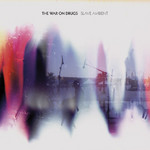
Slave Ambient (LP)
 $60.00
Low Stock
add to cart
more by this artist
$60.00
Low Stock
add to cart
more by this artist
The War On Drugs
Slave Ambient (LP)
[ Secretly Canadian / LP ]
Release Date: Monday 15 August 2011
Should this item be out of stock at the time of your order, we would expect to be able to supply it to you within 2 - 5 business days.
Slidin'. Ramblin'. Driftin'. Movin'. Strugglin'. The War on Drugs frontman Adam Granduciel is all of these things on Slave Ambient, the Philly outfit's second full-length release. Given these professed feelings of restlessness and uneasiness, it's no surprise the band's hypno-roots-rock is all about forward motion and momentum, favoring steady, locomotive rhythms that rarely pause or waver-- elements that reinforce Granduciel's efforts to make his problems disappear in the rearview mirror.
Slave Ambient shares several qualities with its 2008 predecessor, Wagonwheel Blues: a sense of open-freeway abandon and splendid isolation set against a glorious expanse; an unabashed admiration for FM-radio Americana icons of yore (Springsteen, Dylan, Petty); and a willingness to buff the band's gritty edges with serene, if randomly deployed, instrumentals and reprises. In other words, the War on Drugs still deal in "excellent road trip music," as Pitchfork's Stephen Deusner described Wagonwheel Blues. However, this time Granduciel is less interested in documenting the environmental and economic travesties he sees unfolding outside his window as he is the internal dramas swirling around in his head. Nearly every song here expresses some desire to get outta town and start anew.
The band responds by amplifying the more textural qualities of their sound: dreamy synth drones, liquefied electric-guitar leads that linger and fade like raindrops rolling down the windshield, and the most tasteful use of smooth saxophone this side of Kaputt. (Interestingly enough, Slave Ambient was recorded without founding member Kurt Vile, who applies a similarly lysergic approach on his latest solo release, Smoke Ring For My Halo-- for fans of rustic rock'n'roll, the two albums collectively yield an embarrassment of riches not experienced since Wilco and Son Volt released A.M. and Trace in tandem.) When the band's wide-screened psychedelic flourishes are fused with Granduciel's well-worn Dylan- and Petty-isms, songs like "Brothers" and "It's Your Destiny" wondrously conjure nothing so much as the Traveling Wilburys recording for mid-1980s 4AD. Or in the case of the excitable "Baby Missiles" (a holdover from last year's stop-gap Future Weather EP), it's as if the Spiritualized and Springsteen albums filed alphabetically next to one another in your record collection had melted together on a hot August afternoon.
But as much as the War on Drugs make music to accompany an escape to something better, they're the sort of band that believes the journey is more important than the destination. The songs on Slave Ambient don't necessarily end in a place very different from where they began, but through subtle sonic manipulations and layering-- like in the last two minutes of opener "Best Night", where the guitars, piano, and melodica start to blur into the same blissful wavelength-- they give the impression that a great distance has been traveled. The really amazing thing about the album is how anthemic and affirming it feels despite the near total absence of proper sing-along choruses. Case in point, centerpiece track "Come to the City" is all about ascension, rising out of the miasmic haze of preceding interlude "The Animator" and gradually accruing all the confidence and verve of Live Aid-era U2. But rather than work up a chest-thumping, Bono-worthy wail, Granduciel is happy to sit back and ride out the song's dense waves of sound, to prolong the euphoric feeling of anticipation-- the road trip he's soundtracking is very much his own, and he's as much a slave to the ambience as we are. 8.3 / 10 Pitchfork.
Tracks:
A1 Best Night
A2 Brothers
A3 I Was There
B1 Your Love Is Calling My Name
B2 The Animator
B3 Come To The City
C1 Come For It
C2 It's Your Destiny
C3 City Reprise #12
D1 Baby Missiles
D2 Original Slave
D3 Black Water Falls